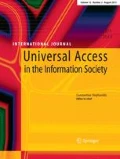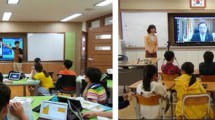Abstract
This research examined the usability of an interactive mobile application (tablet application) designed to teach daily living skills to individuals with intellectual disabilities (ID). Effectiveness, efficiency, and satisfaction aspects were investigated. The persistence of a newly learned skill, operating a vacuum cleaner, was assessed following training sessions. The study also examined how well participants generalized the skill to a different tool and setting after learning via the interactive tablet application. In addition, to determine the social validity of the study, five special education teachers’ views (satisfaction levels) about the tablet application were examined. To determine the efficiency of the tablet application, differences in time of intervention sessions between the pilot study and the main study were investigated. A single-case research methodology was employed with a multiple baseline design. Furthermore, to identify the usability issues of educational tablet applications, heuristic evaluation and user test methods were used together. One male and four females with a diagnosis of intellectual disability took part in the study. All participants improved their ability to use the vacuum cleaner and performed the skill correctly following the intervention sessions. Performance during generalization and maintenance sessions also met defined success criteria. Efficiency data show that changes in the tablet application decrease the significant amount of time spent for intervention. It is an important result for individuals with ID who might not be able to focus attention over a longer period of time. The results of this study show that using the interactive tablet applications in the education of individuals with ID is an effective method for improving their daily living skills.


Similar content being viewed by others
References
Acungil, A.T.: Bilgisayar destekli etkinlik çizelgeleriyle sunulan öğretimin otizm spektrum bozukluğu gösteren çocukların çizelge izleme ve rol oyun becerilerini öğrenmedeki etkileri [Effectiveness of a Tablet Computer Instruction Program (TACIP) Presented Via Audio-Visual Technologies on Teaching the Use of Tablet Computers to Students with Intellectual Disabilities] (Unpublished master’s thesis). Anadolu University, Eskişehir, Turkey (2014)
Armutçu, O.A.: Zihinsel yetersizlikten etkilenmiş öğrencilere word belgesi üzerine yazi yazma becerisinin kazandirilmasinda eşzamanli ipucu işlem süreci ile yapilan öğretimin etkililiği [The Effects of Simultaneous Prompting Procedures When Teaching Writing Skills to Children with Mental Retardation Using Word Documents] (Unpublished master’s thesis). Gazi University, Ankara, Turkey (2008)
Aruk, I.: Bilişim teknolojilerinin zihinsel engellilerin e-eğitiminde kullanılması ve örnek bir uygulama geliştirilmesi [The Usage of Informatics Technologies for the Mentally Disabled in e-Learning and the Improvement of an Application as an Example] (Unpublished master’s thesis) (Unpublished master’s thesis). Trakya University, Edirne, Turkey (2008)
Ayres, K.M., Maguire, A., McClimon, D.: Acquisition and generalization of chained tasks taught with computer based video ınstruction to children with autism. Educ. Train. Dev. Disabil. 44(4), 493–508 (2009)
Baer, D.M., Wolf, M.M., Risley, T.R.: Some current dimensions of applied behavior analysis. J. Appl. Behav. Anal. 1, 91–97 (1968)
Başoğlu, E.D.: Zihinsel engelli öğrenciler için bir eğitim yazılımının geliştirilmesi, uygulanması ve değerlendirilmesi [Developing, Implementing and Evaluating an Education Software for Students with Mental Retardation] (Unpublished master’s thesis). Sakarya University, Sakarya, Turkey (2009)
Bertini, E.S., Kimani, S.: Mobile devices: opportunities for users with special needs. In: Chittaro, L. (ed.) Mobile HCI 2003, LNCS 2795, pp. 486–491. Springer, Berlin (2003)
Billingsley, F., White, O.R., Munson, R.: Procedural reliability: a rationale and an example. Behav. Assess. 2, 229–241 (1980)
Brown, D.J., Powell, H.M., Battersby, S., Lewis, J., Shopland, N., Yazdanparast, M.: Design guidelines for interactive multimedia learning environments to promote social inclusion. Disabil. Rehabil. 24(11–12), 587–597 (2002)
Burke, R.V., Andersen, M.N., Bowen, S.L., Howard, M.R., Allen, K.D.: Evaluation of two instruction methods to increase employment options for young adults with autism spectrum disorders. Res. Dev. Disabil. 31, 1223–1233 (2010)
Cagiltay, K., Karasu, N., Cakir, H., Kaplan-Akilli, G., Cicek, F.: Innovative educational technology for special education and usability issues. Paper presented at HCI International, Crete, Greece (2014, June)
Cannella, H.I., O’Reilly, M.F., Lancioni, G.E.: Choice and preference assessment research with people with severe to profound developmental disabilities: a review of the literature. Res. Dev. Disabil. 26, 1–15 (2005)
Çatak, A.: Powerpoint sunu programıyla hazırlanan okuma materyalinin eğitilebilir zihin engelli öğrencilerin okuduğunu anlama becerisi üzerine etkisi [The Effect of PowerPoint Software on Educable Mentally Retarded Students’ Reading Comprehension Skill] (Unpublished master’s thesis). Abant Izzet Baysal University, Bolu, Turkey (2006)
Cihak, D., Fahrenkrog, C., Ayres, K., Smith, C.: The use of video modeling via a video iPod and a system of least prompts to improve transitional behaviors for students with autism spectrum disorders in the general education classroom. J. Posit. Behav. Interv. 12(2), 103–115 (2010)
da Cunha, R.D., Neiva, F.W., da Silva, R.L.D.S.: Virtual reality as a support tool for the treatment of people with intellectual and multiple disabilities: a systematic literature review. Rev Inform. Teór. Apl. 25(1), 67–81 (2018)
Dalgın-Eyyip, Ö.: Bilgisayar destekli etkinlik çizelgeleriyle sunulan öğretimin otizm spektrum bozukluğu gösteren çocukların çizelge izleme ve rol oyun becerilerini öğrenmedeki etkileri [The Effects of Teaching Process with Computer-Based Activity Schedules on the Schedule Following and Pretend Play Skills of Children with ASD] (Unpublished master’s thesis). Anadolu University, Eskişehir, Turkey (2011)
Edwards, B.J., Blackhurst, A.E., Koorland, M.A.: Computer-assisted constant time delay prompting to teach abbreviation spelling to adolescents with mild learning disabilities. J. Spec. Educ. Technol. 12, 301–311 (1995)
Fernández-Lopez, Á., Rodríguez-Fórtiz, M.J., Rodríguez-Almendros, M.L., Martínez-Segura, M.J.: Mobile learning technology based on iOS devices to support individuals with special education needs. Comput. Educ. 61, 77–90 (2013). https://doi.org/10.1016/j.compedu.2012.09.014
Flanagan, S., Bouck, E.C., Richardson, J.: Middle school special education teachers’ perceptions and use of assistive technology in literacy instruction. Assist. Technol. 25(1), 24–30 (2013). https://doi.org/10.1080/10400435.2012.682697
Flores, M., Musgrove, K., Renner, S., Hinton, V., Strozier, S., Franklin, S., Hil, D.: A comparison of communication using the Apple iPad and a picture-based system. Augment. Altern. Commun. 28(2), 74–84 (2012)
Foster, S.L., Mash, E.J.: Assessing social validity in clinical treatment research issues and procedures. J. Consult. Clin. Psychol. 67(3), 308–319 (1999)
Gast, D.L., Ledford, J.R. (eds.): Single Case Research Methodology: Applications in Special Education and Behavioral Sciences, 2nd edn. Routledge, New York (2014)
Holstein, J.: Tablets for Autism: Tablet Computers Provide a Voice for the Autistic. ViewSonic Corporation, Walnut (2012)
Hourcade, J.P., Williams, S.R., Miller, E.A., Huebner, K.E., Liang, L.J.: Evaluation of tablet apps to encourage social interaction in children with autism spectrum disorders. In: Proceedings of CHI’13: The SIGCHI Conference on Human Factors in Computing Systems, pp. 3197–3206. ACM, New York (2013). https://doi.org/10.1145/2470654.2466438
Jhangiani, R.S., Chiang, I.A., Price, P.C.: Research Methods in Psychology-2nd Canadian Edition (2015)
Kagohara, D.M., Sigafoos, J., Achmadi, D., van der Meer, L., O’Reilly, M., Lancioni, G.: Teaching students with developmental disabilities to operate an iPod Touch to listen to music. Res. Dev. Disabil. 32(6), 2987–2992 (2011)
Kagohara, D.M., van der Meer, L., Ramdoss, S., O’Reilly, M.F., Lancioni, G.E., Davis, T.N., Rispoli, M., Lang, R., Marschik, P.B., Sutherland, D., Green, V.A.: Using iPods® and iPads® in teaching programs for individuals with developmental disabilities: a systematic review. Res. Dev. Disabil. 34(1), 147–156 (2013)
Kanpolat, Y.E.: Otistik bireylere adı söylenen giysiyi gösterme becerisinin öğretiminde bilgisayar aracılığıyla sunulan eşzamanlı ipucuyla öğretimin etkililiği [The Effectiveness of Simultaneous Prompting Procedures Presented by Computers on Teaching the Skill of Naming Items of Clothing to Individuals with Autism] (Unpublished master’s thesis). Abant Izzet Baysal University, Bolu, Turkey (2008)
Kazdin, A.E.: Assessing the clinical or applied importance of behavior change through social validation. Behav. Modif. 1, 427–452 (1977)
Koehler, M.J., Mishra, P.: What is technological pedagogical content knowledge? Contemp. Issues Technol. Teach. Educ. 9(1), 60–70 (2009)
Korozi, M., Leonidis, A., Ntoa, S., Arampatzis, D., Adami, I., Antona, M., Stephanidis, C.: Designing an augmented tabletop game for children with cognitive disabilities: the “Home game” case. Br. J. Edu. Technol. 49(4), 701–716 (2018)
Kuzu, A., Cavkaytar, A., Odabaşı, H.F., Erişti, S.D., Çankaya, S.: Development of mobile skill teaching software for parents of individuals with intellectual disability. Turk. Online J. Qual. Inq. 5(2), 11–26 (2014)
Lopez, A.F., Fortiz, M.J.R., Garcia, M.N.: Designing and supporting cooperative and ubiquitous learning systems for people with special needs. In: Meersman, R., Herrero, P., Dillon, T. (eds.) On the Move to Meaningful Internet Systems: OTM 2009 Workshops, LNCS 5872, pp. 423–432. Springer, Berlin (2009)
Martin, S.S.: A sampling of activities used in special education teacher preparation coursework: meeting the standards. In: Proceedings of Society for Information Technology and Teacher Education International Conference, vol. 2004, no. 1, pp. 4930–4935. AACE, Norfolk (2004)
Microsoft External Research: Mobile Device Uses Images to Help Children with Autism Interact (2013). http://web.cgu.edu/faculty/leroy/content/Other-content/health_smartphone_autism_communication_final.pdf
Nam, C.S., Bahn, S., Lee, R.: Acceptance of assistive technology by special education teachers: a structural equation model approach. Int. J. Hum. Comput. Interact. 29(5), 365–377 (2013). https://doi.org/10.1080/10447318.2012.711990
Nielsen, J.: Usability Engineering. Academic Press, Boston (1993)
Özak, H.: Zihinsel yetersizliği olan ögrencilere okuma becerilerinin ögretiminde bilgisayar aracılığıyla sunulan eş zamanlı ipucuyla öğretimin etkililiği [The Effects of Simultaneous Prompting Presented Via Computer on the Reading Skills of Mentally Disabled Students] (Unpublished master’s thesis). Abant Izzet Baysal University, Bolu, Turkey (2008)
Tanju, E.H.: 4–5 yaş grubu zihinsel engelli çocuklara şekil, renk ve sayı kavramlarının kazandırılmasında bilgisayar destekli eğitimin etkisinin incelenmesi [An Investigation Into the Effects of Computer-Assisted Education on the Acquisition Of Shape, Color, and Number Concepts by Mentally Handicapped Children Aged 4–5] (Unpublished doctoral dissertation). Hacettepe University, Ankara, Turkey (2004)
Tawney, J.W., Gast, D.L.: Single Subject Research Design in Special Education. Merrill, Columbus (1984)
Uçar, Ö.: Engelli çocuklar için yapay zeka tabanlı eğitim-destek araçları geliştirilmesi [Development of Artificial Intelligence-Based Assistive Tools for the Education of Disabled Children] (Unpublished doctoral dissertation). Trakya University, Edirne, Turkey (2007)
Upadhyay, N.: M-learning: a new paradigm in education. Int. J. Instr. Technol. Distance Learn. 3(2), 31–34 (2006)
Van Laarhoven, T., Johnson, J.W., Van Laarhoven-Myers, T., Grider, K.L., Grider, K.M.: The effectiveness of using a video iPod as a prompting device in employment settings. J. Behav. Educ. 18, 119–141 (2009)
William, P., Nicholas, D.: Testing the usability of information technology applications with learners with special educational needs (SEN). J. Res. Spec. Educ. Needs 6(1), 31–41 (2006)
Wolf, M.M.: Social validity: the case for subjective measurement or how applied behavior analysis is finding its heart. J. Appl. Behav. Anal. 11, 203–214 (1978)
Yee, H.S.S.: Mobile technology for children with autism spectrum disorder: major trends and issues. In: Proceedings of IS3e 2012: IEEE Symposium on E-Learning, E-Management and E-Services, pp. 1–5 (2012, October). https://doi.org/10.1109/is3e.2012.6414954
Yıldırım, A., Şimşek, H.: Qualitative Research Methods in the Social Sciences, 2nd edn. Seçkin, Ankara (2000)
Author information
Authors and Affiliations
Corresponding author
Additional information
Publisher's Note
Springer Nature remains neutral with regard to jurisdictional claims in published maps and institutional affiliations.
Rights and permissions
About this article
Cite this article
Yeni, S., Cagiltay, K. & Karasu, N. Usability investigation of an educational mobile application for individuals with intellectual disabilities. Univ Access Inf Soc 19, 619–632 (2020). https://doi.org/10.1007/s10209-019-00655-0
Published:
Issue Date:
DOI: https://doi.org/10.1007/s10209-019-00655-0




